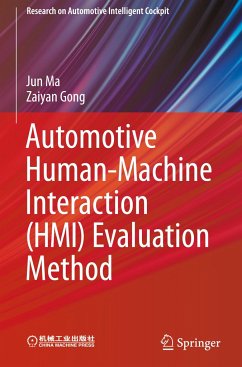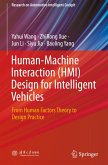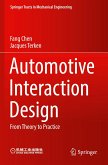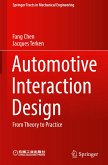This book focuses on the evaluation methodology for automotive human-machine interaction (HMI), which aim to reduce driving distractions, lower operational loads, optimize user experience design, and enhance user value.
The book is divided into three parts. The first part, consisting of Chapters 1-3, introduces the evolution of automotive HMI and proposes a three-dimensional orthogonal evaluation system for automotive HMI that is comprehensive, systematic, and quantifiable. This evaluation system incorporates all evaluation items into a spatial matrix consisting of three dimensions: interaction tasks, interaction modalities, and evaluation indexes. The second part provides a comprehensive presentation and in-depth discussion of the evaluation indexes. The three rational evaluation indexes are utility, safety, and efficiency, which can be tested by the real-car driving simulator. The four emotional evaluation indexes are cognition, intelligence, value, and aesthetics. In orderto standardize the latter two subjective indexes, this book summarizes common differences in value between Chinese and European users and organizes typical aesthetic orientations in automotive UI based on art history research. The third part introduces the application of this HMI evaluation system in the automotive R&D process, including how to integrate the evaluation into a real product development process to achieve efficient product iteration.
This book is suitable for intelligent cockpit and HMI designers, engineers, and researchers. It is also used as a reference for product managers and students in the field of intelligent connected vehicles.
The book is divided into three parts. The first part, consisting of Chapters 1-3, introduces the evolution of automotive HMI and proposes a three-dimensional orthogonal evaluation system for automotive HMI that is comprehensive, systematic, and quantifiable. This evaluation system incorporates all evaluation items into a spatial matrix consisting of three dimensions: interaction tasks, interaction modalities, and evaluation indexes. The second part provides a comprehensive presentation and in-depth discussion of the evaluation indexes. The three rational evaluation indexes are utility, safety, and efficiency, which can be tested by the real-car driving simulator. The four emotional evaluation indexes are cognition, intelligence, value, and aesthetics. In orderto standardize the latter two subjective indexes, this book summarizes common differences in value between Chinese and European users and organizes typical aesthetic orientations in automotive UI based on art history research. The third part introduces the application of this HMI evaluation system in the automotive R&D process, including how to integrate the evaluation into a real product development process to achieve efficient product iteration.
This book is suitable for intelligent cockpit and HMI designers, engineers, and researchers. It is also used as a reference for product managers and students in the field of intelligent connected vehicles.








